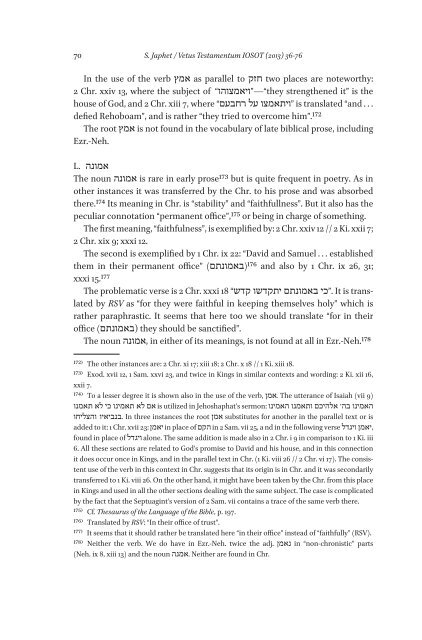Special Issue IOSOT 2013 - Books and Journals
Special Issue IOSOT 2013 - Books and Journals
Special Issue IOSOT 2013 - Books and Journals
Create successful ePaper yourself
Turn your PDF publications into a flip-book with our unique Google optimized e-Paper software.
70 S. Japhet / Vetus Testamentum <strong>IOSOT</strong> (<strong>2013</strong>) 36-76<br />
In the use of the verb אמץ as parallel to חזק two places are noteworthy:<br />
2 Chr. xxiv 13, where the subject of they“—”ויאמצוהו“ strengthened it” is the<br />
house of God, <strong>and</strong> 2 Chr. xiii 7, where על רחבעם“ ”ויתאמצו is translated “<strong>and</strong> . . .<br />
defied Rehoboam”, <strong>and</strong> is rather “they tried to overcome him”.172<br />
The root אמץ is not found in the vocabulary of late biblical prose, including<br />
Ezr.-Neh.<br />
אמונה .L<br />
The noun אמונה is rare in early prose173 but is quite frequent in poetry. As in<br />
other instances it was transferred by the Chr. to his prose <strong>and</strong> was absorbed<br />
there.174 Its meaning in Chr. is “stability” <strong>and</strong> “faithfullness”. But it also has the<br />
peculiar connotation “permanent office”,175 or being in charge of something.<br />
The first meaning, “faithfulness”, is exemplified by: 2 Chr. xxiv 12 // 2 Ki. xxii 7;<br />
2 Chr. xix 9; xxxi 12.<br />
The second is exemplified by 1 Chr. ix 22: “David <strong>and</strong> Samuel . . . established<br />
them in their permanent office” 176(באמונתם) <strong>and</strong> also by 1 Chr. ix 26, 31;<br />
xxxi 15.177<br />
The problematic verse is 2 Chr. xxxi 18 באמונתם יתקדשו קדש“ .”כי It is translated<br />
by RSV as “for they were faithful in keeping themselves holy” which is<br />
rather paraphrastic. It seems that here too we should translate “for in their<br />
office )באמונתם( they should be sanctified”.<br />
The noun ,אמונה in either of its meanings, is not found at all in Ezr.-Neh.178<br />
172) The other instances are: 2 Chr. xi 17; xiii 18; 2 Chr. x 18 // 1 Ki. xiii 18.<br />
173) Exod. xvii 12, 1 Sam. xxvi 23, <strong>and</strong> twice in Kings in similar contexts <strong>and</strong> wording: 2 Ki. xii 16,<br />
xxii 7.<br />
174) To a lesser degree it is shown also in the use of the verb, .אמן The utterance of Isaiah (vii 9)<br />
האמינו בה׳ אלהיכם ותאמנו האמינו sermon: is utilized in Jehoshaphat’s אם לא תאמינו כי לא תאמנו<br />
substitutes for another in the parallel text or is אמן In three instances the root .בנביאיו והצליחו<br />
,יאמן ויגדל in 2 Sam. vii 25, a nd in the following verse הקם in place of יאמן 23: added to it: 1 Chr. xvii<br />
found in place of ויגדל alone. The same addition is made also in 2 Chr. i 9 in comparison to 1 Ki. iii<br />
6. All these sections are related to God’s promise to David <strong>and</strong> his house, <strong>and</strong> in this connection<br />
it does occur once in Kings, <strong>and</strong> in the parallel text in Chr. (1 Ki. viii 26 // 2 Chr. vi 17). The consistent<br />
use of the verb in this context in Chr. suggests that its origin is in Chr. <strong>and</strong> it was secondarily<br />
transferred to 1 Ki. viii 26. On the other h<strong>and</strong>, it might have been taken by the Chr. from this place<br />
in Kings <strong>and</strong> used in all the other sections dealing with the same subject. The case is complicated<br />
by the fact that the Septuagint’s version of 2 Sam. vii contains a trace of the same verb there.<br />
175) Cf. Thesaurus of the Language of the Bible, p. 197.<br />
176) Translated by RSV: “In their office of trust”.<br />
177) It seems that it should rather be translated here “in their office” instead of “faithfully” (RSV).<br />
178) Neither the verb. We do have in Ezr.-Neh. twice the adj. נאמן in “non-chronistic” parts<br />
(Neh. ix 8, xiii 13) <strong>and</strong> the noun .אמנה Neither are found in Chr.








![Am HaSefer [Volk des Buches] - Books and Journals](https://img.yumpu.com/20648352/1/174x260/am-hasefer-volk-des-buches-books-and-journals.jpg?quality=85)







